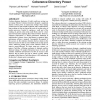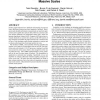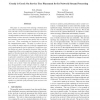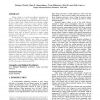66 search results - page 13 / 14 » Aggregating processor free time for energy reduction |
ISLPED
2010
ACM
13 years 5 months ago
2010
ACM
On-chip coherence directories of today's multi-core systems are not energy efficient. Coherence directories dissipate a significant fraction of their power on unnecessary loo...
IPPS
2006
IEEE
13 years 11 months ago
2006
IEEE
We characterize the performance and power attributes of the conjugate gradient (CG) sparse solver which is widely used in scientific applications. We use cycle-accurate simulatio...
ICS
2010
Tsinghua U.
13 years 7 months ago
2010
Tsinghua U.
Existing supercomputers have hundreds of thousands of processor cores, and future systems may have hundreds of millions. Developers need detailed performance measurements to tune ...
ICDCS
2006
IEEE
13 years 11 months ago
2006
IEEE
This paper is concerned with reducing communication costs when executing distributed user tasks in a sensor network. We take a service-oriented abstraction of sensor networks, whe...
MICRO
2009
IEEE
13 years 11 months ago
2009
IEEE
Voltage scaling is one of the most effective mechanisms to reduce microprocessor power consumption. However, the increased severity of manufacturing-induced parameter variations a...




